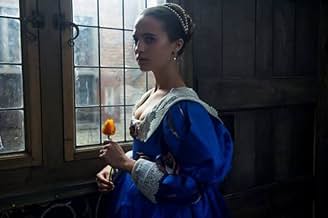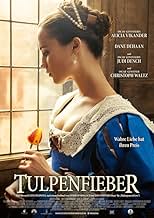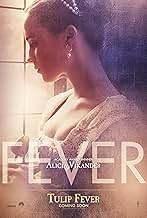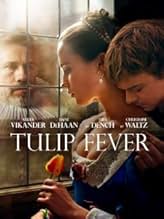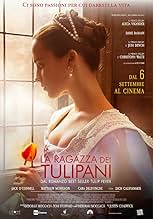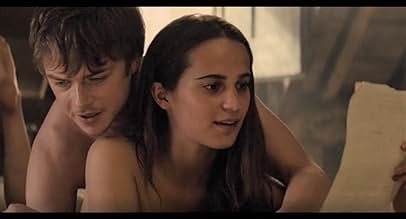AVALIAÇÃO DA IMDb
6,2/10
24 mil
SUA AVALIAÇÃO
Uma artista se apaixona por uma jovem casada e é contratada para pintar seu retrato durante a mania do século 17 em Amsterdã.Uma artista se apaixona por uma jovem casada e é contratada para pintar seu retrato durante a mania do século 17 em Amsterdã.Uma artista se apaixona por uma jovem casada e é contratada para pintar seu retrato durante a mania do século 17 em Amsterdã.
- Direção
- Roteiristas
- Artistas
- Prêmios
- 1 indicação no total
Richard Alan Reid
- Bidder 1
- (as Richard Reid)
Avaliações em destaque
I had the privilege of seeing this film in preview in the famous Tuschinski theatre in the heart of the canal district in Amsterdam. Having enjoyed the novel whilst living there in 2011, I have watched as it's release dates have been continually changed giving all the signs of a production in distress. Early rumours of poor test screenings can be damaging whether true or not! Like another reviewer I found the opening narration at odds with the images and consequently confusing. The first 40 minutes edited in a pedestrian style merely to tick off necessary plot points, and without any sensitivity to mood or place, so prevalent in the novel. Strangely, the movie seemed to be both full of beautiful 'pictures', historical detail, visual treats and mood, and yet at the same time, the continued use of one street set left it feeling small and enclosed and almost like stage set. Little sense of Amsterdam as a City State enjoying a glorious rise on the world stage. At that point (after 40 minutes) having laid out the plot points and established the characters, the film starts to build, thanks to the real tension in the original story, a good script and some fine performances. I got over a niggling feeling of disappointment at the 'smallness' of the set production, and instead decided to enjoy the abundant visual detail and the way the story started to rip along. Ultimately the great story rose above the shaky first reel and the production design above its limited scale. I was with two friends who hadn't read the book, and we all three came to really enjoy the film, despite the confused and hurried beginnings. It deserves to rise above its production history and be widely seen and enjoyed. It doesn't quite reach the heights of the source material, but it's far from a failure with much to enjoy.
Tulipmania is one of Europe's weirder historical events. Unfortunately, the movie barely touches on the tulip market craze, except as a deus ex machina to bestow sudden wealth and/or loss on characters who we barely care about and who do nothing to deserve it.
The main problem with the film is that the love triangle that is supposed to be the main story appears out of nowhere -- one of the characters simply looks up pensively, as if he just solved a riddle, and declares, "I'm in love!" Up until that point, he had shared maybe 60 seconds of screen time with the object of his affection. How can we care about the contrived swings in fortune of such shallow people?
Making things worse, this love triangle movie has five main characters, leading to underdeveloped characters, repetition of ideas and unnecessary subplots.
I loved the sets and I thought that Christoph Waltz, Holliday Grainger and Jack O'Connell did great jobs with the little they had to work with.
The main problem with the film is that the love triangle that is supposed to be the main story appears out of nowhere -- one of the characters simply looks up pensively, as if he just solved a riddle, and declares, "I'm in love!" Up until that point, he had shared maybe 60 seconds of screen time with the object of his affection. How can we care about the contrived swings in fortune of such shallow people?
Making things worse, this love triangle movie has five main characters, leading to underdeveloped characters, repetition of ideas and unnecessary subplots.
I loved the sets and I thought that Christoph Waltz, Holliday Grainger and Jack O'Connell did great jobs with the little they had to work with.
Great cast! Fine Acting! Glossy cinematography! Terrific sets! Excellent costuming! Even an intriguing first half of the film! Yet, ultimately Justin Chadwick's historical romantic drama concerning a 17th-century painter in Amsterdam who falls in love with a married woman whose portrait he has been commissioned to paint, during the period known as "Tulip Mania", fails due to its implausible, improbable, narrative outcomes.
It just goes to show that films left on the studio shelves for 3 years after being completed, before being released, as was the case with Tulip Fever, are usually top - shelved for good reason. In this case the film seems to have suffered through a combination of script and editing deficiencies and some poor directorial choices. It results in a movie that doesn't seem to know whether it wants to be some sort of comedy - drama, or straight out melodrama in corsets.
Whether due to editing or some other production choice, nothing much is ever made really clear. The titular, historically authentic,Tulip Fever itself is barely sketched out and then only against the incessant noise and rowdy crowds of Amsterdam's flower markets. Early in the film a quite close and friendly relationship is hinted at between the 2 female leads, Sophia (Alicia Vikander), a wealthy merchant's unhappy young wife and her maidservant, the more earthy and world - wise Maria (Holiday Grainger). Their love - lives are compared and contrasted with Sophia clearly ensnared in a loveless arranged marriage. But this thread is never really consolidated.
Instead we are served up a mish - mash of multiple storylines concerning fake and real pregnancies, suspicious lovers and various characters seeking their fortunes through investment in an over - heated tulip market. It all ends up being ludicrously implausible and both unfunny and undramatic, with a tacked on, unconvincing conclusion. What a waste!
I've given it a 6, because I'm sure there will be some, who like me, appreciate historical films such as this, with obviously high production values. There's no getting around the fact that Tulip Fever looks good. And Alicia Vikander is perfect as Sophia, plucked from obscurity in an orphanage and selected to marry for her great beauty. Similarly, Grainger succeeds as the pragmatic, Maria, who is anything but a dullard, or your conventional notion of a put upon servant. But these positives can't disguise that Tulip Fever ends up looking and sounding like a completely miscalculated opportunity, rather than a significantly interesting, period drama.
It just goes to show that films left on the studio shelves for 3 years after being completed, before being released, as was the case with Tulip Fever, are usually top - shelved for good reason. In this case the film seems to have suffered through a combination of script and editing deficiencies and some poor directorial choices. It results in a movie that doesn't seem to know whether it wants to be some sort of comedy - drama, or straight out melodrama in corsets.
Whether due to editing or some other production choice, nothing much is ever made really clear. The titular, historically authentic,Tulip Fever itself is barely sketched out and then only against the incessant noise and rowdy crowds of Amsterdam's flower markets. Early in the film a quite close and friendly relationship is hinted at between the 2 female leads, Sophia (Alicia Vikander), a wealthy merchant's unhappy young wife and her maidservant, the more earthy and world - wise Maria (Holiday Grainger). Their love - lives are compared and contrasted with Sophia clearly ensnared in a loveless arranged marriage. But this thread is never really consolidated.
Instead we are served up a mish - mash of multiple storylines concerning fake and real pregnancies, suspicious lovers and various characters seeking their fortunes through investment in an over - heated tulip market. It all ends up being ludicrously implausible and both unfunny and undramatic, with a tacked on, unconvincing conclusion. What a waste!
I've given it a 6, because I'm sure there will be some, who like me, appreciate historical films such as this, with obviously high production values. There's no getting around the fact that Tulip Fever looks good. And Alicia Vikander is perfect as Sophia, plucked from obscurity in an orphanage and selected to marry for her great beauty. Similarly, Grainger succeeds as the pragmatic, Maria, who is anything but a dullard, or your conventional notion of a put upon servant. But these positives can't disguise that Tulip Fever ends up looking and sounding like a completely miscalculated opportunity, rather than a significantly interesting, period drama.
A pretty good period piece set in an interesting location during an even more interesting time, could have been great, but overall it's still good enough.. Christoph Waltz walks on water as always!
How could such a beautiful looking movie fall so flat? Sumptuous filming, a stellar cast, with brilliant period sets and costumes are not enough to disguise the fact that Tulip Fever (2017) drowns under the weight of its own plot contrivance and melodramatic performances.
Set in 17th Century Amsterdam, it tells the story of an orphan who "arrived barefoot and left in a carriage". Selected to marry for her great beauty, Sophia's (Alicia Vikander) sole purpose is to bear a child for wealthy merchant Cornelius (Christopher Waltz) whose first marriage was barren. Cornelius commissions struggling artist Jan (Dane DeHaan) to paint their portrait to celebrate his wealth and her beauty but the artist immediately falls under her spell. While the affair progresses, her maidservant Maria (Holliday Grainger) falls pregnant to a fishmonger and the two women concoct a subterfuge whereby Sophia pretends to be pregnant to keep Maria's secret. As a background sub-plot, Jan seeks his fortune in the over-heated tulip market by purchasing the rarest of tulip specimens from an imperious nun (Judi Dench). Melodrama turns into farce as the multiple narratives interweave, tighten, yet ultimately go nowhere.
High visual production values do not make up for story implausibility. The months of unsuccessful mating between Cornelius and Sophia is portrayed as a bawdy comedy of nightly rituals where Cornelius struggles to perform his marital duties. The affair under her husband's nose, the fake pregnancy, and fake birth are all ludicrously implausible. The background tale of wild speculations on the fickle tulip market is a distraction rather than necessary for Jan's predictable investment outcomes. The script sounds unnatural and dialogue is delivered unconvincingly: many lines are spoken across class boundaries in ways that would have been unimaginable in that era. With a top- shelf cast, the acting is flawless although Alicia Vikander stands out for the way she plays the same Alicia Vikander that we have seen in several films. The chemistry with both husband and lover is of the barely flickering variety, and her impersonation of Mona Lisa is, as always, impeccable.
Does the film's ending justify the effort? Disappointingly, no. The fate of all the characters is disconnected from the narrative flow and the storyline threads remain dangling in the wind. For some audiences, the beauty of this production will be worth the commitment. However, after an hour and forty-five minutes, all we learn is that great beauty, wealth, greed, and deception, do not bring happiness; nor do aesthetics alone make a great movie.
Set in 17th Century Amsterdam, it tells the story of an orphan who "arrived barefoot and left in a carriage". Selected to marry for her great beauty, Sophia's (Alicia Vikander) sole purpose is to bear a child for wealthy merchant Cornelius (Christopher Waltz) whose first marriage was barren. Cornelius commissions struggling artist Jan (Dane DeHaan) to paint their portrait to celebrate his wealth and her beauty but the artist immediately falls under her spell. While the affair progresses, her maidservant Maria (Holliday Grainger) falls pregnant to a fishmonger and the two women concoct a subterfuge whereby Sophia pretends to be pregnant to keep Maria's secret. As a background sub-plot, Jan seeks his fortune in the over-heated tulip market by purchasing the rarest of tulip specimens from an imperious nun (Judi Dench). Melodrama turns into farce as the multiple narratives interweave, tighten, yet ultimately go nowhere.
High visual production values do not make up for story implausibility. The months of unsuccessful mating between Cornelius and Sophia is portrayed as a bawdy comedy of nightly rituals where Cornelius struggles to perform his marital duties. The affair under her husband's nose, the fake pregnancy, and fake birth are all ludicrously implausible. The background tale of wild speculations on the fickle tulip market is a distraction rather than necessary for Jan's predictable investment outcomes. The script sounds unnatural and dialogue is delivered unconvincingly: many lines are spoken across class boundaries in ways that would have been unimaginable in that era. With a top- shelf cast, the acting is flawless although Alicia Vikander stands out for the way she plays the same Alicia Vikander that we have seen in several films. The chemistry with both husband and lover is of the barely flickering variety, and her impersonation of Mona Lisa is, as always, impeccable.
Does the film's ending justify the effort? Disappointingly, no. The fate of all the characters is disconnected from the narrative flow and the storyline threads remain dangling in the wind. For some audiences, the beauty of this production will be worth the commitment. However, after an hour and forty-five minutes, all we learn is that great beauty, wealth, greed, and deception, do not bring happiness; nor do aesthetics alone make a great movie.
Você sabia?
- CuriosidadesThis movie was shot in 2014 but the release was postponed for three years. The first test screening happened in November 2014 and didn't get positive reactions. This movie was originally scheduled to be released in June 2016, but the release date was pushed to July 2016, then to February 2017, August 25, 2017, and it was finally released in theaters in September 1, 2017.
- Erros de gravaçãoWhen Jan is telling the bailiffs "if I was liquid now I'd be a bigger fool than I look," his mouth stops moving well before the dubbed line finishes.
- Citações
Cornelis Sandvoort: First to flower, first to fall.
- ConexõesReferenced in Midnight Screenings: Valley of Bones (2017)
Principais escolhas
Faça login para avaliar e ver a lista de recomendações personalizadas
- How long is Tulip Fever?Fornecido pela Alexa
Detalhes
Bilheteria
- Orçamento
- US$ 25.000.000 (estimativa)
- Faturamento bruto nos EUA e Canadá
- US$ 2.455.635
- Fim de semana de estreia nos EUA e Canadá
- US$ 1.158.017
- 3 de set. de 2017
- Faturamento bruto mundial
- US$ 9.204.549
- Tempo de duração
- 1 h 45 min(105 min)
- Cor
- Mixagem de som
- Proporção
- 2.35 : 1
Contribua para esta página
Sugerir uma alteração ou adicionar conteúdo ausente







